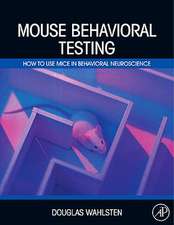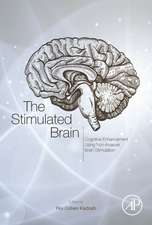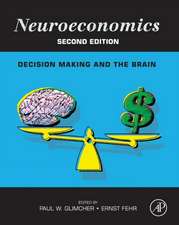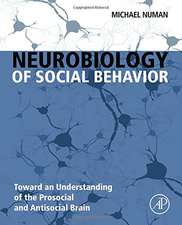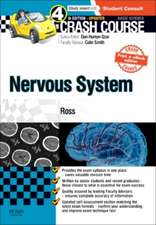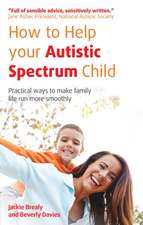Motivation: Theory, Neurobiology and Applications: Progress in Brain Research, cartea 229
Bettina Studer, Stefan Knechten Limba Engleză Hardback – 27 oct 2016
In addition, tactics on how to connect these different research and knowledge fields within a common (theoretical) framework of motivation is discussed. Thus, in short, the book provides an integrative, interdisciplinary, up-to-date accounting on the neurobiology of motivation and how it might be boosted.
- Provides an integration of the neurosciences, their clinical challenges, and applicable research
- Includes both an interdisciplinary and integrative nature
- Contains a broad array of subject matter that will be of interest to a large target audience
- Presents contributions from experts in their respective fields
Din seria Progress in Brain Research
- 9%
 Preț: 1159.33 lei
Preț: 1159.33 lei - 5%
 Preț: 1615.08 lei
Preț: 1615.08 lei - 39%
 Preț: 1230.29 lei
Preț: 1230.29 lei - 9%
 Preț: 1232.44 lei
Preț: 1232.44 lei - 9%
 Preț: 1232.44 lei
Preț: 1232.44 lei - 5%
 Preț: 1281.30 lei
Preț: 1281.30 lei - 9%
 Preț: 1226.58 lei
Preț: 1226.58 lei - 5%
 Preț: 1281.42 lei
Preț: 1281.42 lei - 9%
 Preț: 1229.83 lei
Preț: 1229.83 lei - 9%
 Preț: 1232.44 lei
Preț: 1232.44 lei - 9%
 Preț: 1226.78 lei
Preț: 1226.78 lei - 32%
 Preț: 1228.99 lei
Preț: 1228.99 lei - 32%
 Preț: 1233.29 lei
Preț: 1233.29 lei - 29%
 Preț: 1283.57 lei
Preț: 1283.57 lei - 29%
 Preț: 1215.87 lei
Preț: 1215.87 lei - 32%
 Preț: 1154.95 lei
Preț: 1154.95 lei - 9%
 Preț: 1154.27 lei
Preț: 1154.27 lei - 9%
 Preț: 1151.54 lei
Preț: 1151.54 lei - 9%
 Preț: 1164.52 lei
Preț: 1164.52 lei - 9%
 Preț: 1160.07 lei
Preț: 1160.07 lei - 5%
 Preț: 1207.95 lei
Preț: 1207.95 lei - 32%
 Preț: 1161.07 lei
Preț: 1161.07 lei - 32%
 Preț: 1157.18 lei
Preț: 1157.18 lei - 5%
 Preț: 2062.98 lei
Preț: 2062.98 lei - 9%
 Preț: 1155.98 lei
Preț: 1155.98 lei - 9%
 Preț: 1164.43 lei
Preț: 1164.43 lei - 9%
 Preț: 1164.43 lei
Preț: 1164.43 lei - 9%
 Preț: 1158.65 lei
Preț: 1158.65 lei - 9%
 Preț: 1164.50 lei
Preț: 1164.50 lei - 9%
 Preț: 1149.16 lei
Preț: 1149.16 lei - 9%
 Preț: 1159.43 lei
Preț: 1159.43 lei - 5%
 Preț: 1214.52 lei
Preț: 1214.52 lei - 9%
 Preț: 1153.55 lei
Preț: 1153.55 lei - 9%
 Preț: 1156.91 lei
Preț: 1156.91 lei - 9%
 Preț: 1156.05 lei
Preț: 1156.05 lei - 9%
 Preț: 1159.50 lei
Preț: 1159.50 lei - 9%
 Preț: 1156.91 lei
Preț: 1156.91 lei - 5%
 Preț: 1205.96 lei
Preț: 1205.96 lei - 9%
 Preț: 1161.24 lei
Preț: 1161.24 lei - 41%
 Preț: 1084.00 lei
Preț: 1084.00 lei - 29%
 Preț: 1212.66 lei
Preț: 1212.66 lei
Preț: 1221.36 lei
Preț vechi: 1342.15 lei
-9% Nou
Puncte Express: 1832
Preț estimativ în valută:
233.78€ • 254.02$ • 196.50£
233.78€ • 254.02$ • 196.50£
Carte tipărită la comandă
Livrare economică 14-28 aprilie
Preluare comenzi: 021 569.72.76
Specificații
ISBN-13: 9780444637017
ISBN-10: 044463701X
Pagini: 486
Dimensiuni: 191 x 235 x 28 mm
Greutate: 1.23 kg
Editura: ELSEVIER SCIENCE
Seria Progress in Brain Research
ISBN-10: 044463701X
Pagini: 486
Dimensiuni: 191 x 235 x 28 mm
Greutate: 1.23 kg
Editura: ELSEVIER SCIENCE
Seria Progress in Brain Research
Public țintă
This volume targets a broad and interdisciplinary audience, including researchers in affective, behavioural, and clinical neuroscience and in psychology; health care professionals in particular neurologists, physiotherapists, neuropsychologists and psychiatrists; teachers and educational psychologists; and sports coachesCuprins
Preface
Bettina Studer and Stefan Knecht
SECTION 1 –THEORIES OF MOTIVATION
1. Commonalities and differences in psychological and economic approaches to motivation theory
Tina Strombach and Sabrina Strang
2. A cost-benefit model of motivation for activity
Bettina Studer
3. Control feedback as the motivational force beyond habitual behavior
Baruch Eitam
SECTION 2 –ASSESSING MOTIVATION
4. Quantifying Motivation with Effort-Based Decision-Making Paradigms in Health and Disease
Trevor T-J Chong and Masud Husain
SECTION 3 – THE NEUROBIOLOGY OF MOTIVATION
5. Brain correlates of the intrinsic subjective cost of effort in sedentary volunteers
Javier Bernacer
6. To work or not to work: Neural representation of cost and benefit of instrumental action
Nils B. Kroemer and Caroline Burrasch
7. Involvement of Opioid Signaling in Food Preference and Effort-Related Decision Making: Studies in Laboratory Animals
Raul Pastor
8. Individual Differences in Personality Associated with ACC function in Task Switching
Akina Umemoto
9. Competition, testosterone and adult neurobehavioral plasticity
Christoph Eisenegger
10. Fatigue with up- versus down-regulated brain arousal should not be confused
Ulrich Hegerl and Christine Ulke
SECTION 4 – TARGETING MOTIVATION: NOVEL APPROACHES TO ENHANCING MOTIVATION, ACTIVITY AND LEARNING IN HEALTH AND DISEASE
11. Intrinsic motivation, curiosity and learning: theory and applications in educational technologies
Pierre-Yves Oudeyer
12. Incentives and Motivation in an applied context
Tina Strombach and Sabrina Strang
13. Rewarding feedback promotes motor skill consolidation via striatal activity.
Mario Widmer
14. How motivation and reward learning modulate selective attention
Alexia Bourgeois
15. Motivation and Attention following Hemispheric Stroke
Paresh Malhotra
16. Increasing self-directed training in neurorehabilitation patients through competition
Bettina Studer
17. The Role of Dopamine in the Pathophysiology and Treatment of Apathy
Trevor T-J Chong and Masud Husain
18. Changing health behavior: From "I must" to "I want"
Stefan Knecht
SECTION 5: CONCLUSIONS
19. Motivation: What have we learned and what is still missing?
Bettina Studer and Stefan Knecht
Bettina Studer and Stefan Knecht
SECTION 1 –THEORIES OF MOTIVATION
1. Commonalities and differences in psychological and economic approaches to motivation theory
Tina Strombach and Sabrina Strang
2. A cost-benefit model of motivation for activity
Bettina Studer
3. Control feedback as the motivational force beyond habitual behavior
Baruch Eitam
SECTION 2 –ASSESSING MOTIVATION
4. Quantifying Motivation with Effort-Based Decision-Making Paradigms in Health and Disease
Trevor T-J Chong and Masud Husain
SECTION 3 – THE NEUROBIOLOGY OF MOTIVATION
5. Brain correlates of the intrinsic subjective cost of effort in sedentary volunteers
Javier Bernacer
6. To work or not to work: Neural representation of cost and benefit of instrumental action
Nils B. Kroemer and Caroline Burrasch
7. Involvement of Opioid Signaling in Food Preference and Effort-Related Decision Making: Studies in Laboratory Animals
Raul Pastor
8. Individual Differences in Personality Associated with ACC function in Task Switching
Akina Umemoto
9. Competition, testosterone and adult neurobehavioral plasticity
Christoph Eisenegger
10. Fatigue with up- versus down-regulated brain arousal should not be confused
Ulrich Hegerl and Christine Ulke
SECTION 4 – TARGETING MOTIVATION: NOVEL APPROACHES TO ENHANCING MOTIVATION, ACTIVITY AND LEARNING IN HEALTH AND DISEASE
11. Intrinsic motivation, curiosity and learning: theory and applications in educational technologies
Pierre-Yves Oudeyer
12. Incentives and Motivation in an applied context
Tina Strombach and Sabrina Strang
13. Rewarding feedback promotes motor skill consolidation via striatal activity.
Mario Widmer
14. How motivation and reward learning modulate selective attention
Alexia Bourgeois
15. Motivation and Attention following Hemispheric Stroke
Paresh Malhotra
16. Increasing self-directed training in neurorehabilitation patients through competition
Bettina Studer
17. The Role of Dopamine in the Pathophysiology and Treatment of Apathy
Trevor T-J Chong and Masud Husain
18. Changing health behavior: From "I must" to "I want"
Stefan Knecht
SECTION 5: CONCLUSIONS
19. Motivation: What have we learned and what is still missing?
Bettina Studer and Stefan Knecht

